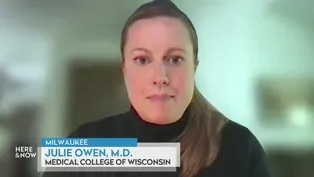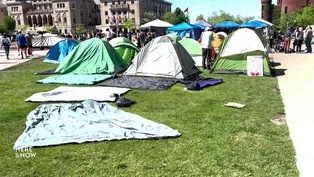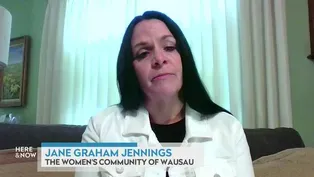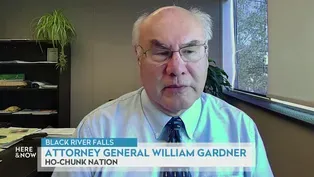Here and Now
Douglas McLeod on Impacts of Pro-Palestinian Campus Protests
Clip: Season 2200 Episode 2243 | 6m 21sVideo has Closed Captions
Douglas McLeod on media coverage about and political implications of campus protests.
UW-Madison journalism professor Douglas McLeod considers media coverage about and political implications of demonstrations that demand the university divest from companies and institutions in Israel.
Here and Now
Douglas McLeod on Impacts of Pro-Palestinian Campus Protests
Clip: Season 2200 Episode 2243 | 6m 21sVideo has Closed Captions
UW-Madison journalism professor Douglas McLeod considers media coverage about and political implications of demonstrations that demand the university divest from companies and institutions in Israel.
How to Watch Here and Now
Here and Now is available to stream on pbs.org and the free PBS App, available on iPhone, Apple TV, Android TV, Android smartphones, Amazon Fire TV, Amazon Fire Tablet, Roku, Samsung Smart TV, and Vizio.
Providing Support for PBS.org
Learn Moreabout PBS online sponsorshipWisconsin.
campus are coming down.
Students for Justice in Palestine agreed to clear the protest encampment, not disrupt graduation ceremonies this weekend and not set up tents again.
In an agreement with the UW-Madison administration.
For its part, the administration will set up a meeting between protesters, the UW Foundation and Alumni Association to discuss how the university's endowment is demands was for the university to divest of investments with Israel.
We want justice, also help UW divest now.
When negotiations broke down between protesters and the university midweek, about 200 people rallied and voiced their disappointment over the Chancellor, saying she lacked authority to divest of investments with Israel.
But in following days talks resumed, with the university eager to end the encampment, which was agreed to Friday just ahead of graduation ceremonies.
What are the implications of these protests at the university campus and campuses across the country?
UW-Madison journalism professor Douglas McLeod is an expert on social protest and media coverage of it.
He joins us now.
Thanks very much for being here.
>> Thank you.
produced messages that support the status quo when covering social protest.
Is coverage of these protests across the country and here supporting the status quo?
>> For the most part, yes.
Most of the research that we've been doing over 35 years has looked at sort of mainstream media coverage in newspapers and then sort of the three minute news packages that are produced to cover social protests.
And we found that just a very common pattern of coverage that sort of typifies a lot of different kinds of protest.
We've looked at left wing protesters, right wing protesters, we've looked at all sorts of different kinds of antiwar, anti-globalization, Asian protests, Black Lives Matter protests, and so we've discovered there's this sort of common pattern when it comes to sort of mainstream news reports.
>> So in this case, what even is the status quo potentially being hewed to?
>> So generally speaking, the status quo would refer to sort of the policies and procedures of the institutions of power, government or corporations, who are often the chosen target of protesters.
But as part of this protest paradigm coverage, their chosen enemy is often ignored and instead the focus is on the actions of the protest, and it's framed as kind of police versus protesters.
And in that sense, the coverage tends to insulate the institution, like government or corporations, from, from critical coverage of some of their policies and, and positions that the protesters would like to raise.
>> And so in your mind, as, as an expert researcher in this field, what is the danger to kind of, civic understanding if it's really kind of one sided?
>> Well, I mean, I think to some degree you can kind of see some of the dangers right now in the current protests.
There's been a lot of attention on police actions on campuses around the country, a lot of attention to encampments being removed, a lot of attention to clashes between protesters and counter protesters, but not much mainstream news coverage is really kind of explaining, hey, what's this protest all about?
What's going on in Gaza?
And how are the protesters trying to effect change when it comes to that particular issue?
>> Speaking of kind of the police movements around these protesters as a as a faculty member on this campus, what was your reaction when the police moved in on the UW-Madison encampment?
>> The concerns are that some of their actions against faculty and students are sometimes more aggressive than they might need to be.
And I've heard some charges, and I don't know whether they're validated or not that, on this campus and elsewhere, some of the more sort of aggressive measures taken by police officers are often addressed, directed at minorities as, students and international students.
pro-Palestinian protest when some Jewish students express feeling marginalized or worse, and others feel they're experiencing Islamophobia like kind of how complicated when passions around enduring conflict and bloodshed in the Middle East come to campus.
>> Yeah.
I mean, this is about as as complicated as you get in terms of protests.
First, you start with the issue in Gaza, and it's not a simple solution.
It's not a case of this side being right and this side being wrong.
It's very, very complicated.
Number one.
Number two, the protests are taking place right here, and they're sort of directed more at things like university investments.
That's kind of a complicated issue.
They're more indirectly connected in some cases to the protest events that are going on in the Middle East and to some degree, you know, in the coverage of this protests that sort of connection to these issues to some degree gets lost.
Right.
protests move presidential policy on Israel?
>> Well, with all the different factors that are trying to shift presidential policy, it's hard to trace it to exactly what is driving what, we know that protest can have a big impact.
We don't have to go far back into our own history to the civil rights movement, say, in the 1950s and 60s to see the profound impact that that kind of social protest and demonstrations had on affecting public policy.
We know that is the case there.
I think history is going to have to take a look at this particular case to see, to what extent the protesters themselves has had an impact.
Dr. Julie Owen on Police, Sedatives and 'Excited Delirium'
Video has Closed Captions
Dr. Julie Owen on the "excited delirium" diagnosis and forcible injection of sedatives. (6m 54s)
Here & Now opening for May 10, 2024
Video has Closed Captions
The introduction to the May 10, 2024 episode of Here & Now. (1m 31s)
Jane Graham Jennings on Funding for Crime Victim Services
Video has Closed Captions
Jane Graham Jennings on a funding drop limiting capacity to provide aid to crime victims. (5m 48s)
William Gardner on the Ho-Chunk Nation and Cannabis Laws
Video has Closed Captions
William Gardner on the Ho-Chunk Nation voting to decriminalize cannabis on tribal lands. (5m 26s)
Providing Support for PBS.org
Learn Moreabout PBS online sponsorship














